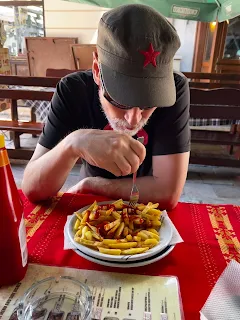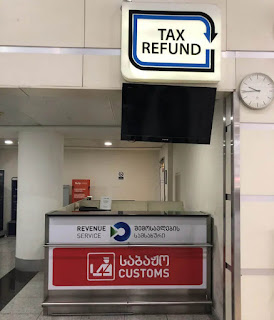Tips for Travelling and Surviving in the Balkans as a Vegan
Eating in local restaurants in the Balkans can be a bore as there are only a couple of vegan options available: mixed salad, french fries and Italian pasta with aglio and olio. Even rice is often cooked in broth. However, there is fresh produce available almost throughout the year, from early spring to late fall. Strawberries, cherries, apricots, nectarines, peaches, apples, pears, and plums abound, and vegetables are tasty. Beans and lentils are also part of local diet as well as walnuts and hazelnuts.
Ajvar
One popular vegan-friendly ready-made food that can be found in any shop in any Balkan country is ajvar. It is a popular vegetable spread that is very much like Russian ikra. The two are simply based on different vegetables. Ajvar is made of roasted red peppers while ikra is made of roasted eggplants. Both are delicious and good companions with rice, pasta, bulgur, or bread.
Tahini and peanut butter
North Macedonians make excellent tahini and Serbians make wonderful natural peanut butter. Both are sold in neighbouring countries as well but may be more expensive. Look for the peanut butter in shops selling bio and natural products. The ones in supermarkets contain added sugar.
Breakfast buffets in hotels can offer varity, but they are rarely all-you-can-eat. Here is how Hotel Old Konak buffet looked like 45 minutes before closing time in Skopje, North Macedonia.
Plant-based milk
All well-equipped supermarkets sell plant-based milk products: soy, almond, rice and oat milk. They are imported so the prices are approximately the same as in Europe.
Wine
The Balkan countries didn't invent wine but there are some pretty decent red wines available at affordable price. North Macedonia is the absolute number one. The local grape variety, vranec, produces a dry red wine with deep colour and intense bouquet that is simply a pleasure to sip.
Tea and coffee
Coffee culture varies a lot. While Albanians enjoy excellent espresso in affordable coffeeshops that can be found in every corner, North Macedonians drink Nescafe!Tea is considered a medicine throughout the Balkans and it means herbal tea. Even regular black tea can be hard to find not to speak about green tea. If you are a tea enthousiast, bring your own brews.












Comments
Greetings from a fellow nomad Finn
Georgia has also great variety of fasting food. There it is called just fasting food. The only downside was that it was really salty just like all the foods in Georgia.
Happy travels in Serbia!